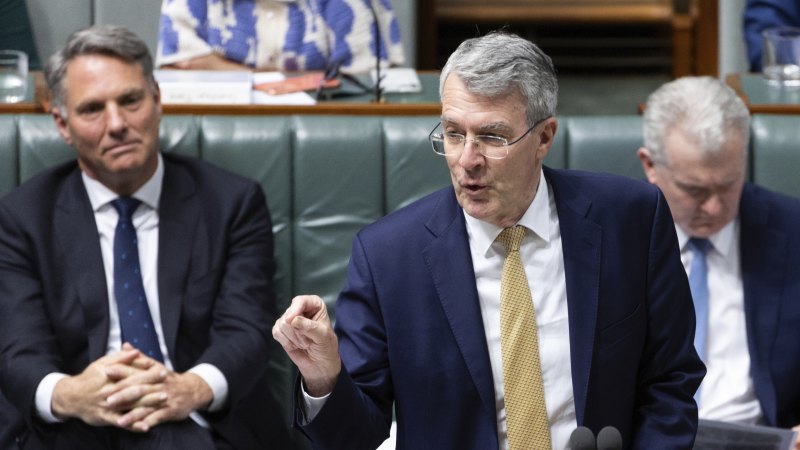Save articles for later
Add articles to your saved list and come back to them any time.
Victims of domestic violence will get a greater slice of the home in property disputes under new laws made to reflect the vulnerability of people escaping abusive relationships.
An exposure draft of family law legislation to be released by Attorney-General Mark Dreyfus on Monday will force courts to consider the effects of family and domestic violence when determining property settlements, following years of advocacy by campaigners.
Family violence will be taken into account in property settlements in legislation to be introduced by Attorney-General Mark Dreyfus.Credit: Alex Ellinghausen
Domestic violence prevention advocate Angela Lynch said women’s groups had long called for the legal recognition of the financial side to marriage breakdowns due to many women and children being forced into poverty, and continuing to experience financial abuse and control, after escaping violent settings.
“We have a responsibility as a community to better accommodate these issues, from a justice and social justice perspective we want better accountability for perpetrators of violence through our court system, that includes the Family Court,” Lynch said.
According to the draft, the amendments say family violence must be considered in settlements.
“Providing a clear legislative basis for the recognition of family violence is intended to better support parties, both in and out of court, to understand the relevance of family violence to property distribution following separation,” it says.
“This recognises that family violence is a significant community issue that carries real financial impact and is of increasing relevance to family law property matters.”
The parliamentary joint standing committee on the family law system recommended in its second interim report in March 2021 that courts should take domestic violence into account when apportioning property. The recommendation was similarly made by a Liberal-led Senate inquiry in 2017.
The draft legislation contains a range of other measures, including a specific duty of disclosure in property and financial matters, which would apply during court proceedings or when a party is preparing to start a proceeding.
The amendments compliment a raft of reforms in a separate bill before parliament, which include barring domestic abusers from repeatedly taking their victims to court, as well as scrapping a legal presumption of shared parenting responsibilities to prevent partners from weaponising the courts against their families.
What’s in the best interests of a child will also become the prime consideration in divorce cases when the controversial Howard-era legal presumption that parents have “equal shared responsibility” is abolished.
The streamlined set of factors that judges must consider in cases will include a child’s safety, their views, the benefit of having relationships with both parents, and the child’s developmental, psychological, emotional and cultural needs.
The changes will also require in the majority of cases for an independent children’s lawyer to meet with children involved in disputes to make sure their views are considered; will lower the threshold for the appointment of children’s lawyers in cases of international child abduction; and expand the definition of family for First Nations children to be more inclusive of cultural factors.
That bill is before the Senate after having passed the House of Representatives earlier, while the exposure draft will be introduced into parliament early next year.
Cut through the noise of federal politics with news, views and expert analysis from Jacqueline Maley. Subscribers can sign up to our weekly Inside Politics newsletter here.
Most Viewed in Politics
From our partners
Source: Read Full Article

